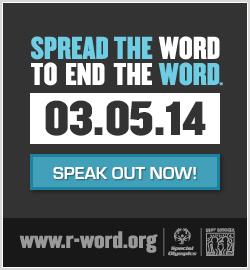First visit? Glad you're here! I hope you'll take a second to "Like" my page on Facebook and subscribe for updates so we can stay connected!
“Don’t you think she’s being retarded?” I heard the words coming out of the person’s mouth and realize she’s looking at me expectantly, waiting for me to chime in and nod in agreement. “Don’t you think…” What do I think? I wouldn’t dare utter the word “retarded” in response. I could answer with a simple yes and laugh it off like the word “retard” never came out of her mouth. I could say “Hey, that’s not nice.” Or, I could bring the casual conversation to a screeching halt and confront the issue head on, pointing out why “retard” is just flat out inappropriate.
Does this conversational encounter sound familiar to you? It’s happened to me far too many times to count. Each one of the possible responses comes with a whole set of issues, and sometimes, no matter how passionate a disability rights advocate you are, none of the options are particularly ideal.
By laughing off a word that unnecessarily insults the entire disability community, you send the message that it’s okay to make disability derogatory. If you mention in passing that the r-word isn’t nice but move right on, the person will probably brush it off, maybe saying “oh you know I didn’t mean anything by it.” So of course, if you really want to Spread the Word to End the Word, you’ll have to directly call out the person who used it. And I understand how challenging it can be to confront discriminatory language. Too often, advocates who speak up are told that we’re overreacting. We’re told to relax because “it’s just a word.”
To that, I say: Never underestimate the power of a word. Even if the word “retard” is thrown around flippantly without conscious negative intentions, it arguably does just as much harm as when the word is directly hurled at someone as an insult. Each time a word like the r-word is used, this perpetuates that the entire concept of disability is derogatory, that disability is a negative quality. Although the r-word has long since been removed from the list of acceptable terminology to refer to cognitive disabilities, we need to remember that it was once a widely accepted disability-related term. The root of the problem with using “retard” as a derogatory word lies not so much in that it’s taken on degrading connotations, but in that it denounces disability as a part of the human experience worthy of respect.
I have a disability and I am worthy of respect. All people who have disabilities, be they cognitive, physical, or emotional, are worthy of respect. Our experiences are valid, and they are worthy of respect. That’s why I support the campaign to end the use of the r-word. It isn’t merely six silly letters, and it isn’t just a joke. Disability is an identity I’m proud of, and under no circumstances should disability ever be derogatory.

Like what you read? Subscribe for weekly updates and be sure to confirm your e-mail!

